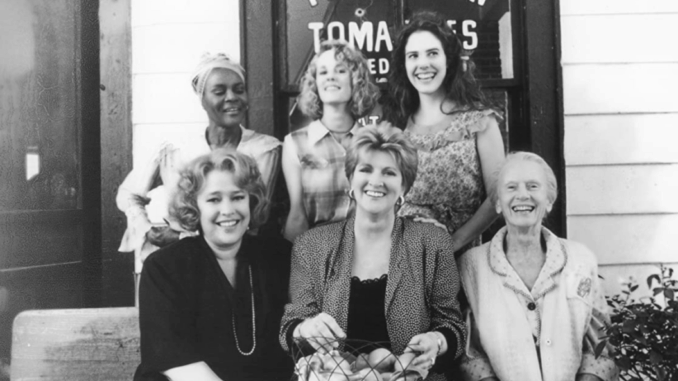
When Fried Green Tomatoes debuted in 1991, it wasn’t just another drama added to the list of Hollywood’s literary adaptations. Instead, it became a rare cinematic gem — one that drew audiences in with its heartfelt storytelling, layered characters, and, most importantly, the perfect balance between an extraordinary script and impeccable acting. Even decades later, the film continues to resonate deeply with viewers, a testament to the craftsmanship that went into both its writing and performances.
A Script That Blends Heart, Humor, and Humanity
At the heart of Fried Green Tomatoes lies its screenplay, adapted from Fannie Flagg’s novel Fried Green Tomatoes at the Whistle Stop Cafe. The script masterfully weaves two timelines — the present-day friendship between Evelyn Couch (Kathy Bates) and Ninny Threadgoode (Jessica Tandy), and the earlier story of Idgie Threadgoode (Mary Stuart Masterson) and Ruth Jamison (Mary-Louise Parker).
What makes the script so captivating is its seamless blend of humor, drama, and emotional honesty. Every line feels purposeful — from Evelyn’s hilarious “Towanda!” battle cry to the intimate and heartfelt conversations between Idgie and Ruth. The writers didn’t rely solely on plot; instead, they created dialogue that captured the nuances of human connection, the sting of loss, and the courage it takes to live authentically.
The screenplay also stands out for its rich themes. It tackles love in its many forms — romantic, platonic, and familial — alongside difficult topics like domestic abuse, racial prejudice, and mortality. Yet, it never feels preachy. Instead, the lessons are wrapped in authentic moments that feel lived-in rather than manufactured.
Performances That Breathe Life Into Every Word
A great script can falter without the right cast, but Fried Green Tomatoes struck gold with its ensemble. Each actor didn’t just play their role — they inhabited it fully.
-
Mary Stuart Masterson gave Idgie Threadgoode her rebellious charm, mischievous humor, and emotional vulnerability. Idgie’s defiance against societal norms felt authentic because Masterson delivered it with both swagger and heart.
-
Mary-Louise Parker brought warmth and quiet strength to Ruth Jamison, making her transformation from a sheltered woman to a courageous figure both believable and deeply moving.
-
Kathy Bates turned Evelyn Couch from a timid, self-doubting housewife into a self-assured woman with confidence and purpose — a change so gradual and natural that audiences found themselves cheering for her by the end.
-
Jessica Tandy, in one of her most memorable later-career performances, infused Ninny with wit, wisdom, and an irresistible twinkle, making her both a storyteller and a life mentor to Evelyn.
Even the supporting characters — from Sipsey (Cicely Tyson) to Smokey Lonesome (Stan Shaw) — felt fully realized. Every actor brought a depth that made Whistle Stop feel like a real place with real people.

A Perfect Symbiosis Between Page and Performance
The true magic of Fried Green Tomatoes lies in how the script and acting worked in perfect harmony. The screenplay gave the actors rich, layered material, and in turn, the performances elevated those words into something unforgettable. The humorous moments landed effortlessly because the actors understood the rhythm of the dialogue, while the emotional beats struck with devastating impact because they were rooted in genuine character work.
A prime example is the famous “Towanda!” scene. On paper, it’s a humorous release of Evelyn’s pent-up frustration, but Kathy Bates turned it into a rallying cry for anyone who has ever felt overlooked or powerless. Likewise, the tender, unspoken moments between Idgie and Ruth carry volumes of meaning without needing lengthy explanations — a testament to both the writing and the actors’ ability to convey emotion beyond words.
Why It Still Resonates Today
Decades after its release, Fried Green Tomatoes continues to draw in new viewers and maintain a loyal fan base. The timeless appeal comes from the fact that the film isn’t just telling a story — it’s telling our stories. Friendship, love, resilience, and the fight for dignity are universal experiences, and the film portrays them with honesty and warmth.
In an era when special effects often overshadow storytelling, Fried Green Tomatoes reminds us of the enduring power of a strong script brought to life by actors who truly understand their characters. It’s proof that cinema’s most powerful magic happens when the written word and human performance come together in perfect harmony.
Fried Green Tomatoes is a shining example of how exceptional writing and acting can create a film that withstands the test of time. The script offered depth, humor, and heartfelt humanity, while the cast delivered performances so authentic that audiences felt like they were part of Whistle Stop’s world. Together, they created a film that doesn’t just entertain — it enriches, inspires, and lingers long after the credits roll.
It’s not just a movie; it’s a reminder of the beauty of human connection and the extraordinary results when storytelling is done right.
